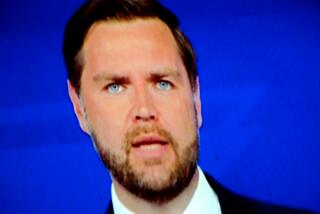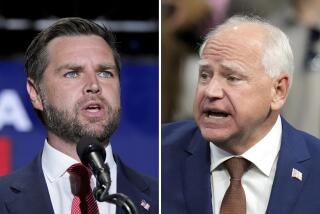Debate Tonight Assumes Vital Importance
- Share via
PHOENIX — Sen. John F. Kerry said he would do better than the Boston Red Sox, and President Bush stayed largely out of view as the Democratic and Republican presidential candidates waited out the final hours before their third, final, and quite possibly most critical, debate tonight, 20 days before election day.
With the outcome of the election balanced on a knife’s point, the handful of undecided voters as well as the core supporters have become points of focus for the two campaigns seeking to eke out a winning margin — and the debate on domestic policy is a key vehicle for reaching them.
The 90-minute confrontation begins at 6 p.m. PDT.
Bush arrived in Phoenix on Tuesday; Kerry flew in today from his final day of preparations spent in Santa Fe, N.M.
At midmorning, Bush visited the debate site, at Arizona State University nearby in Tempe. He spent 19 minutes at the Gammage Auditorium, and did not speak with reporters.
Kerry, chatting with reporters in the morning, said, “I feel great-fantastic. I feel fantastic.” Asked whether he would do better than the Red Sox, his hometown team which lost to the New York Yankees in the first game of the American League championship series on Tuesday night, Kerry replied simply, “Yes.”
The subject matter of the debate — domestic issues, including the economy, social policy and domestic security — was set in an agreement reached by the two campaigns.
No issues go so far to illustrate the cultural clash that has divided the country as those involving domestic policy — emotional matters in many cases that go to the heart of voters’ core beliefs but, given the attention devoted in recent months to the war in Iraq, topics that have not drawn as much attention in the overall political debate this year.
Many are issues that touch raw nerves with key voting blocs: Roman Catholics and evangelical Christians, the elderly, or the impoverished.
The campaigns bombarded supporters, journalists, and the Internet with the lines of attack they anticipated from the other side — and why the other side was wrong or taking positions out of context. The result was a flood of what political jargon has taken to calling “prebuttal,” filled with the sort of invective that has become a foundation of much of the increasingly acerbic general election debate.
The debate topics offer a highway of potential potholes for the candidates as they tailor their messages to the most crucial constituents in the key states: such social issues as abortion, stem cell research, and health care, and such economic matters as joblessness, taxes, and the federal budget deficit.
Mike McCurry, the former White House press secretary who is one of Kerry’s senior advisors, said, “There is going to be a full engagement on health care, so we can make the argument that our health care plan is going to be decidedly better for the middle class.”
He gave away one bit of Kerry strategy: The Democrat will likely wear the same “powerful red” tie he sported in the first two debates, in Coral Gables, Fla., and St. Louis.
“He’s got a lucky tie thing, now,” McCurry said, the unstated implication being that Kerry felt he did well in the first two encounters.
Dan Bartlett, the White House communications chief, said Bush would say that Kerry had accomplished little during his 20 years in the Senate, and was the most liberal member of the Senate.
He said Bush had spent time exercising this morning on an elliptical trainer, and during the afternoon the president was “clearing his head.”
Among the key questions leading up to the debate: Will the candidates move beyond the argumentative-bordering-on-nasty tenor of the first two meetings and discuss specifics of their plans, as surveys and anecdotal evidence suggest the voters want. Or will they succeed in using the debate to reinforce the messages of each campaign: Bush’s theme, that Kerry shifts with the political winds when setting policy course, and Kerry’s theme, that Bush has set an economic course that favors the wealthy and a social policy course built on ideology rather than reason.
With women making up 61% of the undecided voters, according to a Time magazine survey, both campaigns are likely to try to present their approaches to the economy and other domestic issues in a light aimed particularly at attracting their support.
The latest polling shows the race as close in the key states where most attention is focused as in the country as a whole.
The Electoral Scoreboard published daily by the Hotline, a political newsletter, showed Bush with an edge in 28 states, and Kerry leading in 17, giving Bush 245 electoral votes of the 270 needed for election and Kerry 204.
The Hotline cited these results from recent polling: Bush leading 49% to 46% in Iowa, 51% to 43% in Ohio, 46% to 45% in Pennsylvania, and 49% to 44% in Wisconsin. It said Kerry was leading 46% to 41% in New Jersey.
A poll by the Chicago Tribune in much of the same territory found Bush ahead in Iowa 47% to 45%, and Kerry leading in Minnesota 45% to 43%, in Ohio, 49% to 45%, and in Wisconsin, 47% to 43%.
Bush has been trying to stay away from one of the most troublesome statistics for a president seeking reelection: the net loss of jobs during his administration. For the first time since Herbert Hoover’s one term more than seven decades ago at the start of the Great Depression, the United States has lost jobs during Bush’s four years in office.
The president and Vice President Dick Cheney ignore that statistic on the stump and instead point to the 1.7 million jobs created since the summer of 2003-an indication of an economy treading water at best, because 1.6 million new jobs are required just to keep up with population growth.
More to Read
Get the L.A. Times Politics newsletter
Deeply reported insights into legislation, politics and policy from Sacramento, Washington and beyond. In your inbox twice per week.
You may occasionally receive promotional content from the Los Angeles Times.








